#percutaneous nephrolithotomy
Text
Percutaneous Nephrolithotomy (PCNL)
Percutaneous nephrolithotomy (PCNL) is a surgical procedure to remove kidney stones that are too large to pass naturally or by other non-invasive treatments. In this procedure, a small incision is made in the back to create a tunnel through the skin and tissue to access the kidney. Then an endoscope is inserted through the incision to find and remove kidney stones.
PCNL is usually performed under general anesthesia and requires a short hospital stay of 1-3 days. This procedure has a high success rate and is considered safe and effective in treating large or complex kidney stones. This procedure is recommended for patients with kidney stones larger than 2 cm or located in areas of the kidney that are difficult to access with other non-invasive treatments. PCNL is also used in patients with other medical conditions that make other treatments less safe or effective.
Prior to the procedure, the patient may need to have imaging tests, such as a CT scan or ultrasound, to locate kidney stones and determine the best method for their removal. Patients are also advised to stop taking blood thinners such as aspirin and warfarin before surgery to reduce the risk of bleeding.
During surgery, the patient lies on their back and a small incision is made in their back. A guidewire is then inserted into the kidney through the incision and tunneled with a series of dilators. A nephroscope, a thin tubular instrument with a camera and light source, is inserted through a tunnel to locate and remove kidney stones. After the stone is removed, a tube called a nephrostomy tube is inserted into the kidney to drain any remaining fluid and debris.
After the procedure, patients may experience pain or discomfort in the back or abdomen and may be given pain relievers to manage these symptoms. Patients are also advised to drink plenty of fluids to wash away any remaining stone debris. In some cases, patients may need to undergo additional procedures to completely remove all kidney stones.
Overall, PCNL is a safe and effective surgical procedure for treating large or complex kidney stones. Patients should discuss the risks and benefits of this procedure with their doctor to determine if this is the best treatment option for their individual needs.
For more information Visit: www.drmayurdalvi.com
#surgery#urology#PCNL#kidney stones#percutaneous nephrolithotomy#healthcare#medical procedures#minimally invasive surgery#surgical techniques#anesthesia#imaging#nephrology#patient care#recovery#post-operative care#stone removal#surgical instruments#surgical incision#back surgery#abdominal pain
4 notes
·
View notes
Text
Advancements in Percutaneous Nephrolithotomy: A Comprehensive Review -TX hospitals

Introduction:
Percutaneous Nephrolithotomy (PCNL) has witnessed significant advancements in recent years, revolutionizing the treatment of kidney stones. This comprehensive review explores the latest breakthroughs in this minimally invasive procedure.
Advancements in Percutaneous Nephrolithotomy:
Miniaturization of Instruments:
Recent years have seen a remarkable miniaturization of PCNL instruments, allowing for smaller incisions and reduced trauma. This leads to faster recovery times and less postoperative discomfort for patients.
Flexible Ureteroscopy Integration:
The integration of flexible ureteroscopy with PCNL has enhanced the surgeon's ability to visualize and treat complex kidney stones. This combined approach ensures a more thorough stone clearance and reduces the need for multiple procedures.
Improved Imaging Modalities:
Advanced imaging modalities, such as 3D reconstructions and intraoperative ultrasound, have significantly improved the precision of stone localization during PCNL. This ensures a more targeted approach and minimizes damage to surrounding healthy tissue.
Laser Technology:
The incorporation of laser technology in PCNL has revolutionized stone fragmentation. Laser lithotripsy allows for precise and efficient breaking down of stones, even those resistant to traditional methods, leading to higher success rates.
Computer-Assisted Navigation:
Computer-assisted navigation systems provide real-time feedback to surgeons during PCNL procedures. This technology enhances the accuracy of stone targeting and contributes to the overall safety and success of the surgery.
Book Now - 9089489089:
Individuals seeking cutting-edge treatment for kidney stones can now conveniently schedule their procedures. The booking process is seamless, ensuring that patients can access timely and expert care for their urological concerns. To schedule a Percutaneous Nephrolithotomy or consult with a specialist, individuals can call 9089489089.
Conclusion:
The continual advancements in Percutaneous Nephrolithotomy have elevated the standard of care for individuals with kidney stones. With a commitment to patient-centric care and the convenience of easy booking, those in need can receive the best in urological treatment.
0 notes
Text
Best Hospital in Kerala for PERCUTANEOUS NEPHROLITHOTOMY | KIMS Health
Kidney stones, those small, hard mineral deposits that form in the kidneys, can cause excruciating pain and discomfort. Fortunately, modern medicine offers several treatment options, one of which is Percutaneous Nephrolithotomy (PCNL) is treated at the best hospital in Kerala - KIMS Health Trivandrum. This cutting-edge procedure has revolutionized the management of kidney stones, providing patients with a highly effective and minimally invasive approach to stone removal.
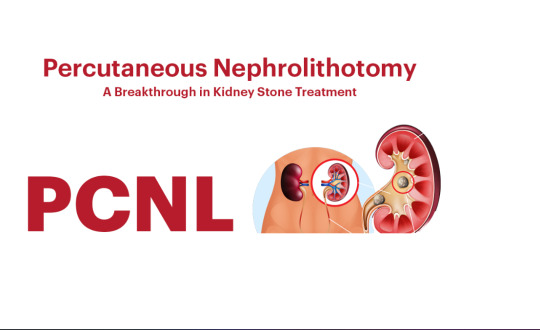
0 notes
Text
Percutaneous Nephrolithotomy Surgery: A Minimally Invasive Approach to Kidney Stone Removal
Percutaneous Nephrolithotomy (PCNL) is a surgical procedure used to remove large or complex kidney stones that cannot be treated effectively with non-invasive methods such as shock wave lithotripsy or ureteroscopy. PCNL involves accessing the kidney through a small incision in the back and is considered a highly effective and minimally invasive approach for kidney stone removal. In this article, we will explore PCNL, its indications, surgical process, recovery, and potential benefits.
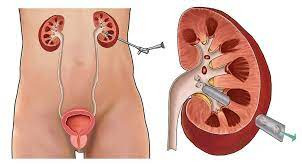
Understanding Kidney Stones: Kidney stones are hard mineral deposits that can form in the kidneys. These stones can vary in size and composition and can cause significant pain, urinary tract infections, and even kidney damage when left untreated. While smaller stones often pass naturally, larger or complex stones may require surgical intervention.
Indications for PCNL: PCNL is typically recommended when kidney stones meet one or more of the following criteria:
Size: Stones that are larger than 2 cm in diameter are difficult to pass naturally and are more effectively treated with PCNL.
Complexity: Stones that are irregularly shaped, located in a calyx deep within the kidney, or associated with anatomical abnormalities.
Failure of Other Treatments: Stones that have not responded to other treatments such as shock wave lithotripsy or ureteroscopy.
The PCNL Procedure: Percutaneous Nephrolithotomy involves the following key steps:
Anesthesia: The patient is placed under general or regional anesthesia to ensure comfort during the procedure.
Incision: A small incision (usually less than 1 cm) is made in the patient's back, typically in the area overlying the kidney where the stone is located.
Guidewire Insertion: A thin, flexible guidewire is inserted through the incision and directed into the kidney.
Dilation: A series of dilators are used to gently enlarge the access tract, creating a pathway to the stone.
Stone Removal: A nephroscope (a thin, tube-like instrument with a camera) is inserted through the access tract to visualize and remove the kidney stone using various tools, such as lasers, graspers, or ultrasonic devices.
Closure: Once the stone is completely removed, the access tract is often closed with a suture or adhesive.
Recovery and Benefits: Recovery from PCNL can vary based on factors like the size and complexity of the stone, but here are some general aspects of recovery:
Post-Op Care: After the procedure, patients typically stay in the hospital for a short period for observation. Pain and discomfort are managed with medications.
Return to Normal Activities: Most patients can return to normal activities within a few weeks, depending on the extent of the surgery.
Benefits: PCNL is highly effective in removing large or complex kidney stones, reducing pain, and preventing recurrent urinary tract infections. It can also help preserve kidney function.
Potential Risks: While PCNL is generally a safe procedure, there are some potential risks and complications, including bleeding, infection, injury to surrounding structures, and post-operative pain.
REFERENCE:
TX Hospitals Group, Hyderabad is one of the country’s largest and fastest-growing chains of multi-super specialty hospitals.
CONTACT : 9089489089
Book an appointment now
0 notes
Text
Percutaneous Nephrolithotomy PCNL Surgery Cost in India
Percutaneous Nephrolithotomy (PCNL) is a minimally invasive surgical procedure used for the removal of kidney stones. It is considered one of the most effective methods to treat large and complex kidney stones. PCNL involves making a small incision in the back and inserting a tube called a nephroscope into the kidney to remove the stones. PCNL procedure is performed under general anesthesia and usually requires a short hospital stay.
PCNL Surgery Cost in India
India has emerged as a popular destination for medical tourism due to its advanced healthcare infrastructure, skilled doctors, and cost-effective treatments. The cost of PCNL surgery in India is significantly lower compared to many other countries. The affordability of PCNL surgery in India makes it an attractive option for patients seeking high-quality medical care at a reasonable price.
The cost of PCNL surgery in India may vary depending on several factors such as the city or hospital where the procedure is performed, the complexity of the case, the surgeon's experience, and additional medical services required. On average, the cost of PCNL surgery in India ranges from INR 1,50,000 to INR 4,00,000 (approximately USD 2,000 to USD 5,500). This cost includes the surgical procedure, hospital stay, anesthesia, and pre- and post-operative care.
Best PCNL Surgery Hospitals in India
India has several world-class hospitals that specialize in urological procedures like PCNL surgery. Below three famous hospitals known for their expertise in PCNL surgery:
Apollo Hospitals, Chennai: Apollo Hospitals is a leading healthcare institution in India, known for its state-of-the-art facilities and a team of highly skilled doctors. The hospital has a dedicated department for urology and is equipped with the latest technology to perform PCNL surgeries with precision.
Medanta - The Medicity, Gurgaon: Medanta is a multi-specialty hospital with a department of urology that offers comprehensive urological services. The hospital has a team of experienced urologists and uses advanced techniques for PCNL surgery, ensuring optimal outcomes for patients.
Fortis Hospital, Mumbai: Fortis Hospital is a renowned healthcare facility in Mumbai that specializes in various medical procedures, including urology. The hospital has a team of proficient urologists who perform PCNL surgeries using advanced equipment and techniques.
Best PCNL Surgery Doctors in India
India has many skilled urologists who are well-known for their expertise in PCNL surgery. Here are three prominent PCNL surgeons in India:
Dr. Rajesh Ahlawat: Dr. Ahlawat is a renowned urologist and the Chairman of the Urology and Kidney Transplantation Department at Medanta - The Medicity, Gurgaon. He is widely recognized for his proficiency in performing complex urological surgeries, including PCNL.
Dr. Anant Kumar: Dr. Kumar is a leading urologist and the Chairman of the Uro-Oncology and Robotic Surgery at Max Super Speciality Hospital, New Delhi. He has extensive experience in urological procedures and is known for his expertise in PCNL surgery.
Dr. PradeepRao: Dr. Rao is a highly skilled urologist and the Director of the Department of Urology and Renal Transplantation at Fortis Hospital, Mumbai. He has a vast experience in performing PCNL surgeries and is recognized for his patient-centric approach.
Al Afiya Medi Tour is one of the best medical tourism companies in India. We are offer medical tourism services in India foreign patients. Some of the main countries are Bangladesh, South Africa, Uganda, Zambia, Namibia, Iraq, Kenya, Ethiopia, Nigeria, and so on. We provide free assistance for TURP surgery cost, lung cancer treatment, breast cancer surgery, stomach cancer treatment, ovarian cancer treatment, liver transplant cost, best hospital for heart valve replacement, liver cancer treatment, bone marrow transplant cost,prostate cancer treatment, arthroscopic surgery, best liver transplant hospital, brain tumor surgery, kidney transplant, cancer treatment, liver transplant treatment, leukemia treatment, best bone marrow hospital, etc. If you are searching for free medical and healthcare consulting to find the best hospitals and top doctors and surgeons in India for any treatment then contact us- Alafiyameditour.com.
Source: https://bestmedicaltourismcompanyinindia.blogspot.com/2023/06/percutaneous-nephrolithotomy-pcnl.html
0 notes
Text
PATHOLOGY OF THE URINARY SYSTEM (aka: STUFF WHAT GOES WRONG WITH YER PISS BEANS)
(AND YER PISS TUBES)
(and the pretty pictures I take of them)
[a warning: this post contains radiographic images and non-graphic description of serious kidney pathologies, including paediatric cancer]
Let's kick off with an old familiar friend! Yeah, I'm talking -
UROLITHIASIS (the humble kidney stone!)
Wanna know something horrific? The biggest kidney stone on record weighed over a kilogram. It was 17 cm across. Just. Imagine. Trying to piss that out…
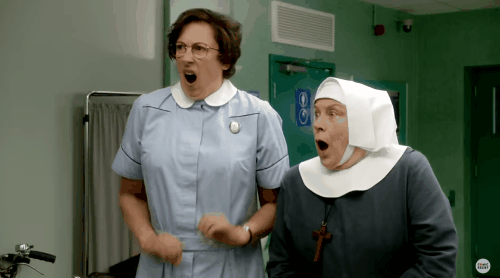
Urolithiases are formed anywhere among your urinary tracts. They’re commonly found in the kidneys, giving rise to the more common term, renal calculi, or kidney stones.
Urolithiasis occurs when compounds within your urine crystallise. If your urine becomes too acidic, too base, contains too many of these compounds for them to remain in solution, or simply… sits around too long without flowing, it literally petrifies into a solid lump!
Some unlucky souls are just… predisposed to developing them. If you have had a kidney stone in the past, you are far more likely to get another one in the future. There also seems to be a genetic link – so if someone in your immediate family gets kidney stones, you have a higher risk.
Kidney stones typically hang out in the pelvis of your kidney and don’t cause an issue. Until you try to piss them out. Remember our kidney diagram (drawn on a conveniently shaped bean)?
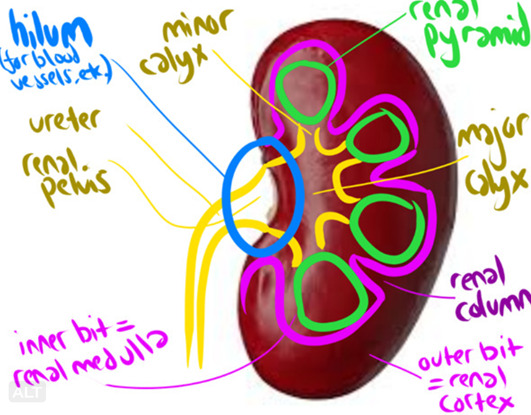
You might notice that the ureters are significantly smaller than the renal pelvis. In other words…

Most renal calculi are made of CALCIUM (oxalate, usually). This is very, very good (for us. Less so for you) because calcium attenuates x-rays – meaning, it glows all pretty and shiny when we take a radiograph!
Here’s a kidney stone on an Abdominal X-Ray!
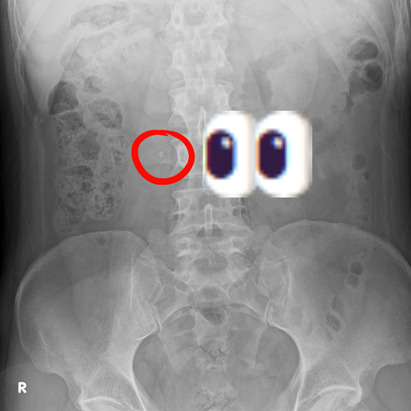
And a twinkly artefact caused by a kidney stone on Ultrasound!
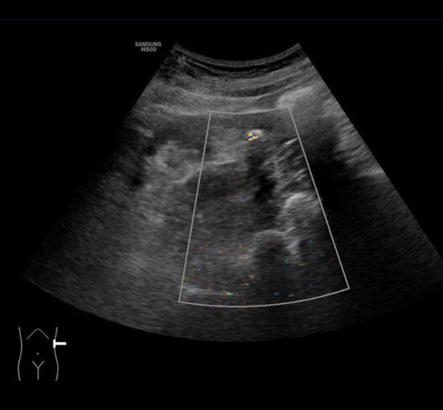
But the best way to assess urolithiases, is, of course, with CT!
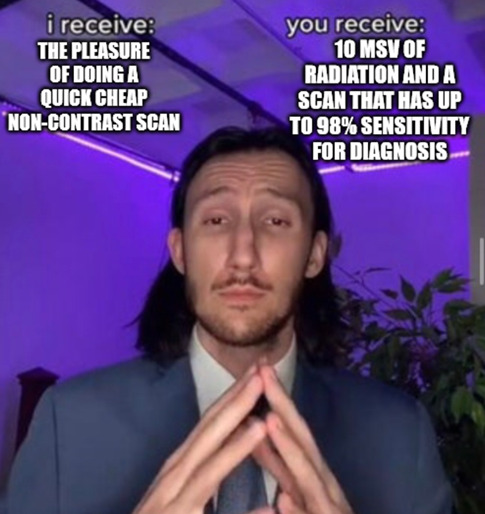
For realsies. We don’t need to inject contrast intravenously, because the kidney stones are (typically) shiny – which cuts down on time and worry, as it means you’re at no risk for having an adverse reaction! So a CT KUB (checking Kidneys, Ureters and Bladder for stones) is basically just a quick tumble in the washing machine (CT scanner), with a lovely clear picture as a result!
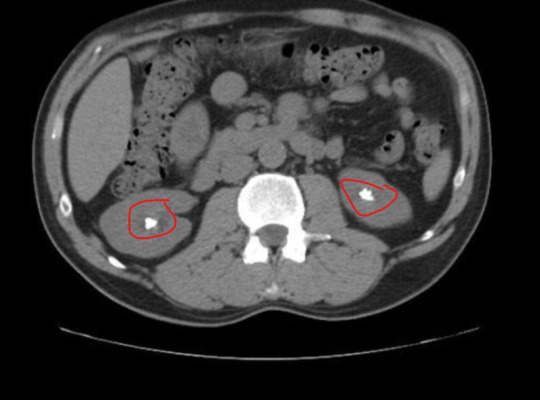
Look at these babies!! So sharp!!! So clear!!!!!! So shiny!!!!!!!!!!!! That’s a beautiful matching pair of renal calculi right there – and to make things better, they’re (currently) non-obstructive, so this patient isn’t in suffering The Agonies!
Speaking of The Agonies…
Most kidney stones are passable, albeit with extreme pain.
However, some ain’t going anywhere. Especially staghorn calculi, which, um. One, stags have antlers. Two…
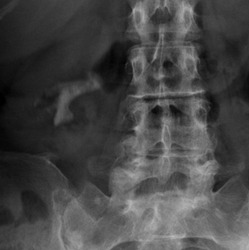
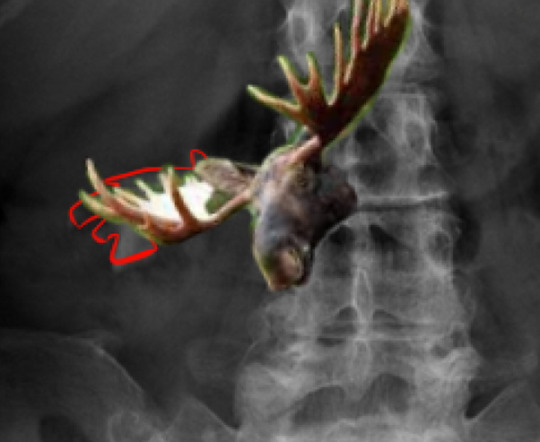
more like a fuckin' MOOSE ANTLER amirite????
But yeah, those buggers aren’t coming out. That’s almost definitely going to require surgery!
Smaller calculi can still cause problems when they become obstructive – i.e., they block the passage of your peepee. They can lead to:
HYDRONEPHROSIS (dilation of the renal pelvis due to retained urine, seen here in the Left kidney [right side of image])
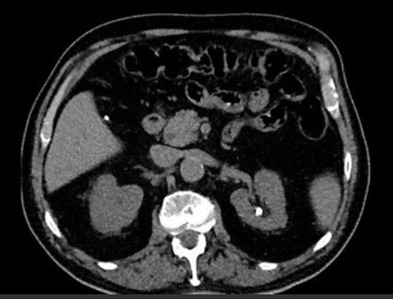
HYDROURETER (dilation of the ureter)
So, what do we do with bothersome calculi? How about some...
EXTRACORPOREAL SHOCKWAVE LITHOTRIPSY (ECSWL, because we love a sexy little acronym here in medworld).
We blast the stone apart with shockwaves, from outside your body! Ultrasound turned up to 11! Unfortunately, it only works on certain densities of stone, and on small stones.
LASER LITHOTRIPSY
(same thing but…. ZIP ZAP LASERZZZZZ]
SURGERY – PERCUTANEOUS NEPHROLITHOTOMY (PCNL).
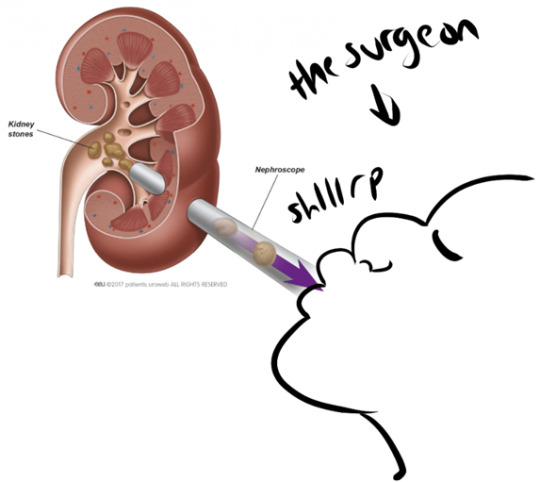
(I totally haven’t added to this diagram in any way. This is how it works. Trust me.)
LOADS of other stuff can go wrong with The Ol’ Piss Beans
We have:
RENAL CELL CARCINOMA
The most common form of kidney cancer.
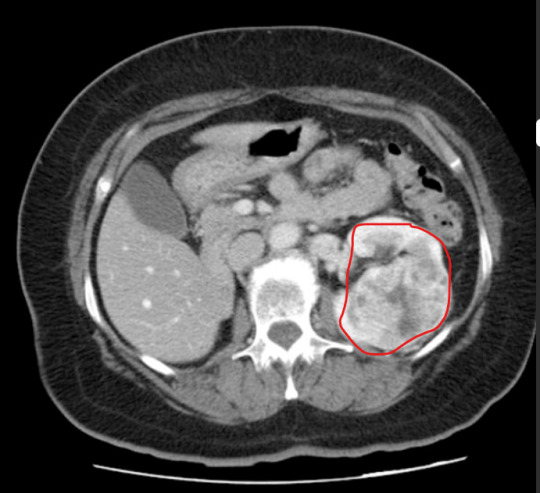
For suspected malignancies, we do a CT Urogram that assesses the whole urinary tract. This takes significantly longer than a KUB, but is well worth the results. This is a three-phase scan. We do...
A regular KUB non-contrast scan to check for calculi and to get our baseline Hounsfield Units ('grayness' and densities) for the kidneys.
Then we inject contrast in a 'split bolus' - one load immediately, and another roughly 8 minutes in, scanning roughly a minute after the second injection is given.
We scan 80 secs after the first contrast bolus is administrered, for the 'nephographic' phase, which enhances the renal cortex & medulla, and makes neoplastic changes and renal masses obvious (see image above).
Then we wait 10-ish minutes and scan for the 'excretory' phase, after the contrast has worked its way through your kidneys, to detect 'filling defects' (anything that stops contrast opacification of the ureters) and pathologies related to the urinary collection system.
NEPHROBLASTOMA
This is one of the more common cancers found in kids. Although paediatric cancer is never exactly a happy topic, this cancer is now curable in roughly 90% of cases, thanks to the early removal of kidneys and the possibility of transplants.
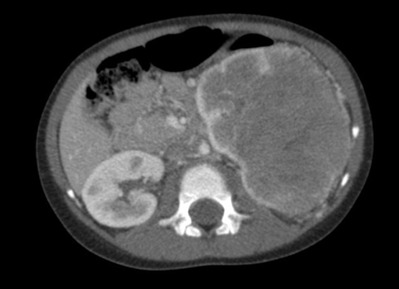
Autosomal Dominant (and Recessive) Polycystic Kidney Disease
An inherited renal disease that can cause you to go into End Stage Renal Failure due to the healthy tissue in your kidneys becoming completely overtaken by cysts. As a result, your kidneys can grow more and more, until they practically fill your whole abdomen. 45% of patients will be in ESRF and need dialysis by the age of 60. Thankfully, transplants are an option.
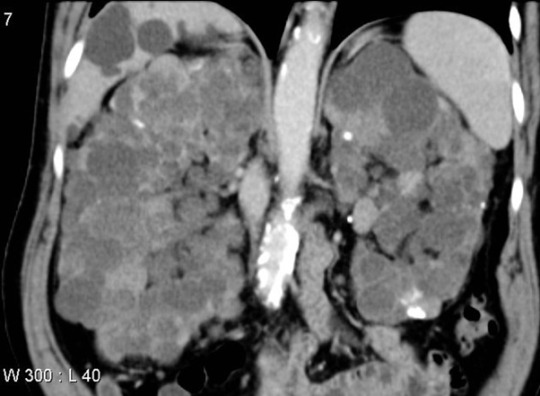
Other commonly encounutered renal pathologies include trauma, which I talked about in my first kidney ramble (linked here!), infections, and more.
I hope you enjoyed this whistle-stop tour of Stuff That Can Go Wrong With The Kidney, And How We Look At Them Gnarly Beans!
....And, um, I spent way too long making this and now need to pee. This is your reminder to go empty that bladder if you need to! Stop those stones!
12 notes
·
View notes
Text
I can ALMOST pay off my hospital bill. Which is great, because guess what? The surgery (shockwave lithotripsy) didn’t work. So I have to go in AGAIN later this year and actually get cut open (percutaneous nephrolithotomy). Doc says it can wait but he’d like to get it done this year while my deductible is met. I’m aiming for late summer. I’ll be in the hospital for one or two days so it’s gonna be fucking expensive. High key wish we’d just done this procedure in the first place, but the odds were high that the other procedure was gonna work. Too bad my luck sucks ass 😑
#she speaks#whole thing’s bullshit tbh#someone tell my kidneys that I do not want their gifts I just want them to do their damn job
4 notes
·
View notes
Text
What treatments are available for kidney stones?
Treatment for kidney stones depends on several factors including the size, location, composition of the stone, and the severity of symptoms.
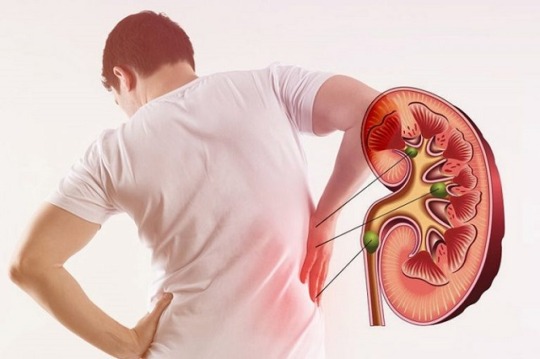
Here's an overview of the various treatment options available:
Watchful Waiting: In cases where kidney stones are small (usually less than 5 millimeters) and asymptomatic, healthcare providers may recommend a "watch and wait" approach. This involves monitoring the patient's condition and symptoms over time to see if the stone passes naturally without intervention. During this period, pain management medications and lifestyle modifications may be recommended to help alleviate discomfort and encourage stone passage.
Pain Management: Pain associated with kidney stones can be severe and may require medical intervention for relief. Over-the-counter pain medications such as ibuprofen or acetaminophen are often used to manage mild to moderate pain. In cases of severe pain, stronger prescription medications may be prescribed.
Medications: Certain medications may be prescribed to help facilitate the passage of kidney stones or to prevent their formation. These medications include:
Alpha-blockers: These drugs help relax the muscles in the ureter, making it easier for the stone to pass.
Pain relievers: Medications such as opioids may be prescribed to alleviate severe pain associated with kidney stones.
Medications to dissolve stones: In some cases, medications such as potassium citrate may be prescribed to help dissolve certain types of kidney stones, such as uric acid stones.
Medications to prevent stone formation: Depending on the underlying cause of kidney stone formation, medications may be prescribed to prevent the recurrence of stones. These may include medications to reduce calcium or uric acid levels in the urine, or to increase urine citrate levels.
Extracorporeal Shock Wave Lithotripsy (ESWL): This non-invasive procedure uses shock waves to break kidney stones into smaller pieces, making them easier to pass through the urinary tract. ESWL is typically used for small to medium-sized stones located in the kidney or upper ureter.
Ureteroscopy (URS): Ureteroscopy involves the insertion of a thin, flexible scope (ureteroscope) into the urethra and bladder, and then up into the ureter to directly visualize and remove kidney stones. This procedure is often used for larger stones or those located in the lower ureter.
Percutaneous Nephrolithotomy (PCNL): PCNL is a minimally invasive surgical procedure used to remove large or complex kidney stones. It involves making a small incision in the back and using a nephroscope to locate and remove the stones from the kidney.
Surgical Intervention: In rare cases where other treatments are unsuccessful or the stones are too large to pass naturally or be removed using less invasive methods, surgical intervention may be necessary. This may involve traditional open surgery to remove the stones or laparoscopic surgery, which is less invasive and involves smaller incisions.
It's important for individuals with kidney stones to work closely with their healthcare providers to determine the most appropriate treatment approach based on their specific situation and needs. Additionally, lifestyle changes such as staying hydrated, following a balanced diet, and avoiding certain foods that can contribute to stone formation may help prevent the recurrence of kidney stones in the future.
0 notes
Text
Understanding Kidney Stone Removal: A Comprehensive Guide
In this comprehensive guide, we delve into the intricate process of kidney stone removal. Kidney stones can be an excruciatingly painful condition, affecting millions of people worldwide. However, with advancements in medical technology and treatment options, kidney stone removal has become more efficient and less invasive.

What Are Kidney Stones?
Kidney stones, also known as renal calculi, are hard mineral and salt deposits that form in the kidneys. These stones can vary in size, from as small as a grain of sand to as large as a golf ball. They develop when certain substances in the urine, such as calcium, oxalate, and uric acid, become highly concentrated and crystallize over time.
Symptoms of Kidney Stones
The symptoms of kidney stones can vary depending on the size and location of the stone. Common signs and symptoms include:
Severe pain in the side and back, below the ribs
Pain that radiates to the lower abdomen and groin
Painful urination
Blood in the urine
Frequent urge to urinate
Nausea and vomiting
Fever and chills (indicating an infection)
Diagnosis and Evaluation
When a patient presents with symptoms suggestive of kidney stones, a thorough medical history and physical examination are conducted. Diagnostic tests may include:
Imaging studies such as X-rays, CT scans, or ultrasounds to visualize the kidneys and detect the presence of stones
Urinalysis to check for signs of infection or blood in the urine
Blood tests to assess kidney function and levels of certain substances that may contribute to stone formation
Treatment Options for Kidney Stone Removal
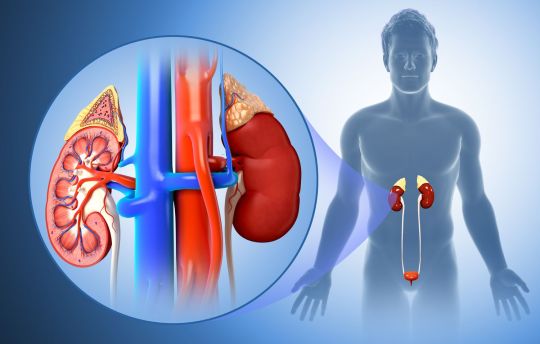
1. Extracorporeal Shock Wave Lithotripsy (ESWL)
ESWL is a non-invasive procedure that uses shock waves to break up kidney stones into smaller fragments, making them easier to pass through the urinary tract. This treatment is suitable for small to medium-sized stones located in the kidney or upper urinary tract.
2. Ureteroscopy (URS)
URS involves the insertion of a thin, flexible scope (ureteroscope) through the urethra and bladder to reach the ureter and kidney. Once the stone is located, it can be fragmented using laser energy and removed or allowed to pass naturally.
3. Percutaneous Nephrolithotomy (PCNL)
PCNL is a minimally invasive procedure performed under general anesthesia. A small incision is made in the back, and a nephroscope is inserted directly into the kidney to remove the stone fragments. This technique is often used for larger stones or those located deep within the kidney.
4. Medical Management
In some cases, small kidney stones may pass spontaneously with the help of pain medication and increased fluid intake. Medications such as alpha-blockers or potassium citrate may also be prescribed to facilitate stone passage and prevent recurrence.
Prevention Strategies
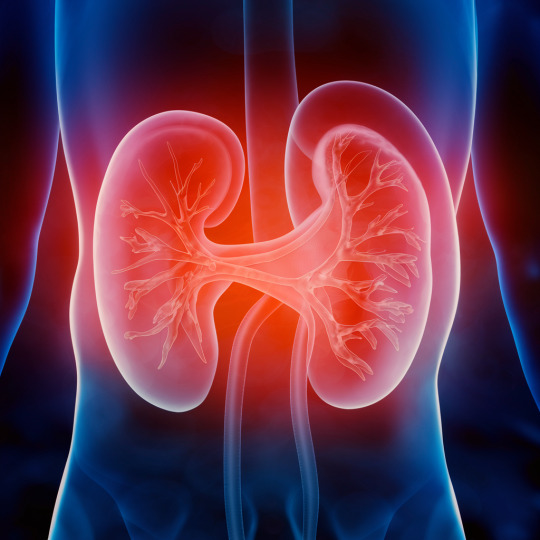
Preventing the formation of kidney stones is key to avoiding recurrent episodes. Here are some lifestyle modifications and preventive measures:
Stay hydrated: Drink plenty of water throughout the day to maintain urine volume and prevent stone formation.
Follow a balanced diet: Limit consumption of foods high in oxalate, sodium, and animal proteins, which can contribute to stone formation.
Monitor calcium intake: Avoid excessive calcium supplementation and aim for a balanced intake of calcium-rich foods.
Manage underlying medical conditions: Conditions such as hyperparathyroidism, gout, and urinary tract infections should be treated promptly to reduce the risk of stone formation.
Conclusion
In conclusion, kidney stone removal encompasses a range of treatment options tailored to the size and location of the stone, as well as the patient's overall health status. Early diagnosis and appropriate management are crucial for relieving symptoms, preventing complications, and reducing the risk of recurrence.
0 notes
Text
Advanced Kidney Stones Treatment in Noida
Kidney stones, though small in size, can cause excruciating pain and discomfort, disrupting daily life and impacting overall well-being. In the vibrant city of Noida, individuals grappling with kidney stones can find solace in the advanced treatment options offered by renowned healthcare facilities. Let's delve into the innovative approaches and comprehensive care available for kidney stones treatment in Noida, empowering patients to overcome this common yet challenging condition.
Cutting-Edge Diagnostic Capabilities
The journey to kidney stone treatment begins with accurate diagnosis, and Noida's leading healthcare centers boast state-of-the-art diagnostic capabilities. Advanced imaging modalities such as CT scans and ultrasound enable precise visualization of kidney stones, facilitating targeted treatment planning tailored to each patient's unique needs.
Minimally Invasive Treatment Modalities
Gone are the days when kidney stone treatment necessitated invasive surgeries and prolonged hospital stays. In Noida, patients benefit from a range of minimally invasive treatment modalities that prioritize comfort and rapid recovery. Techniques such as extracorporeal shock wave lithotripsy (ESWL), ureteroscopy, and percutaneous nephrolithotomy (PCNL) offer effective stone fragmentation and removal with minimal discomfort and downtime.
Comprehensive Care and Multidisciplinary Expertise
At the heart of kidney stone treatment in Noida lies a commitment to comprehensive care and multidisciplinary collaboration. Noida's leading healthcare institutions bring together a team of urologists, nephrologists, radiologists, and support staff to provide holistic care throughout the treatment journey. From initial diagnosis to post-procedural follow-up, patients receive personalized attention and compassionate support every step of the way.
Patient Education and Lifestyle Modification
Empowering patients with knowledge and promoting lifestyle modifications are integral aspects of kidney stone treatment in Noida. Through patient education initiatives and dietary counseling, healthcare professionals equip individuals with the tools and strategies to prevent recurrent kidney stones. By addressing underlying risk factors such as dehydration and dietary imbalances, patients can take proactive steps to safeguard their kidney health and prevent future stone formation.
In conclusion, kidney stone treatment in Noida embodies a harmonious blend of technological innovation, compassionate care, and patient-centricity. With advanced diagnostic capabilities, minimally invasive treatment options, and a multidisciplinary approach to care, individuals facing kidney stones can find relief and renewed hope on their journey to recovery.
0 notes
Text
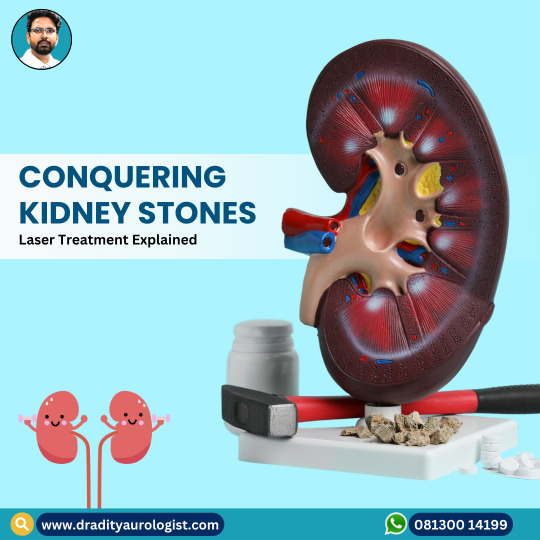
Kidney stones can be incredibly painful and disruptive, but with the right treatment strategies and expert care, you can conquer this common urological condition and reclaim your health. Here, we'll explore effective tips for managing kidney stones and highlight the best urology care options available to you.
Understanding Kidney Stones
Kidney stones are hard deposits of minerals and salts that form in the kidneys and can cause severe pain when they pass through the urinary tract. They can vary in size and composition, with some being as small as a grain of sand while others can grow to be as large as a golf ball. Common symptoms of kidney stones include sharp pain in the back or side, blood in the urine, and difficulty urinating.
Treatment Strategies for Kidney Stones
Stay Hydrated: Drinking plenty of water is essential for preventing the formation of kidney stones. Aim to drink at least 8-10 glasses of water a day to help flush out toxins and prevent mineral buildup in the kidneys.
Follow a Balanced Diet: Certain foods can increase the risk of kidney stone formation, such as those high in oxalates, sodium, and animal proteins. Opt for a diet rich in fruits, vegetables, and whole grains, and limit your intake of processed foods and beverages high in sugar and caffeine.
Manage Underlying Conditions: Conditions such as obesity, diabetes, and high blood pressure can increase the risk of kidney stones. Managing these conditions through lifestyle changes, medication, and regular check-ups can help reduce your risk.
Medication: In some cases, medication may be prescribed to help dissolve kidney stones or alleviate symptoms such as pain and inflammation. Your doctor may recommend pain relievers, alpha blockers, or medications to control underlying conditions that contribute to stone formation.
Medical Procedures: For larger kidney stones or those causing severe symptoms, medical procedures may be necessary to remove or break up the stones. Common procedures include extracorporeal shock wave lithotripsy (ESWL), ureteroscopy, and percutaneous nephrolithotomy (PCNL).
Expert Urology Care for Kidney Stones
When it comes to managing kidney stones, seeking expert urology care is crucial for personalized treatment and optimal outcomes. In Lucknow, sector B, you can find the best endo urology care and uro-oncology care options, including top-rated hospitals and specialists like Dr. Aditya Sharma for female urology care, pediatric urology care, and general urology care.
Conclusion
While kidney stones can be a painful and challenging condition to manage, with the right treatment strategies and expert urology care, you can overcome this obstacle and achieve relief. By following a balanced diet, staying hydrated, managing underlying conditions, and seeking timely medical intervention when needed, you can conquer kidney stones and enjoy better urological health. Don't let kidney stones hold you back—take control of your health and seek the best urology care options available to you.
#best endo urology care in sector b lucknow#best general urology care near me#best female urology care dr. aditya sharma#best pediatric urology care#kidney transplant near me#best uro oncology care near me#male infertility care near me
0 notes
Text
PERCUTANEOUS NEPHROLITHOTOMY (PCNL): A BREAKTHROUGH IN KIDNEY STONE TREATMENT
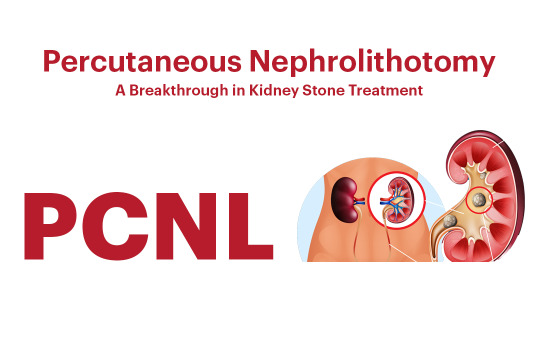
Kidney stones, those small, hard mineral deposits that form in the kidneys, can cause excruciating pain and discomfort. Fortunately, modern medicine offers several treatment options, one of which is Percutaneous Nephrolithotomy (PCNL).
#best kidney stone treatment in trivandrum#best Percutaneous Nephrolithotomy#best hospital for kidney stone#kidney stone treatment#best hospital in trivandrum#kims health hospital
0 notes
Text
Best Kidney Stone Removal in Basavanagudi Bangalore — Himas Hospital
Dealing with kidney stones can be incredibly painful and debilitating. When it comes to getting relief, choosing the right hospital for treatment is crucial. In Basavanagudi, Bangalore, Himas Hospital stands out as a premier destination for Kidney Stone Removal, offering top-notch medical care and advanced treatment options.
Introduction to Kidney Stones
Kidney Stones are hard deposits of minerals and salts that form inside the kidneys. They can cause excruciating pain, urinary problems, and even lead to complications if left untreated. Seeking prompt medical attention is essential to alleviate symptoms and prevent further complications.
Overview of Himas Hospital
Himas Hospital is renowned for its excellence in urology and nephrology services. With a team of highly skilled doctors and state-of-the-art facilities, the hospital is equipped to handle complex cases of kidney stone removal with precision and care.
Location and Facilities
Conveniently located in Basavanagudi, Bangalore, Himas Hospital provides easy access for patients seeking treatment for kidney stones. The hospital boasts modern infrastructure, advanced medical equipment, and comfortable amenities to ensure patients receive the highest standard of care.
Types of Kidney Stone Removal Procedures
Himas Hospital offers a range of procedures for kidney stone removal, including:
Extracorporeal Shock Wave Lithotripsy (ESWL)
Ureteroscopy
Percutaneous Nephrolithotomy (PCNL)
Each procedure is tailored to the patient’s specific condition and aims to effectively break down and remove kidney stones.
Advantages of Choosing Himas Hospital
Patients benefit from choosing Himas Hospital for kidney stone removal due to:
Experienced medical professionals specializing in urology and nephrology.
Advanced treatment options using cutting-edge technology.
Personalized care and attention throughout the treatment process.
Expertise of Medical Professionals
The medical team at Himas Hospital comprises skilled urologists and nephrologists with extensive experience in managing kidney stone cases. Their expertise ensures accurate diagnosis, effective treatment, and compassionate care for every patient.
Procedure and Recovery
The procedure for kidney stone removal varies depending on the size and location of the stones. Following the procedure, patients may experience some discomfort, but recovery is generally quick, allowing them to resume normal activities within a few days.
Cost-effectiveness
Himas Hospital offers cost-effective treatment options for kidney stone removal, ensuring quality care is accessible to all patients. Transparent pricing and flexible payment plans make it easier for patients to undergo treatment without financial strain.
Comparison with Other Hospitals
Himas Hospital stands out from other hospitals in Basavanagudi, Bangalore, due to its:
Specialization in urology and nephrology.
Reputation for excellence in patient care and outcomes.
Comprehensive range of treatment options for kidney stones.
Booking Process and Availability
Booking an appointment at Himas Hospital is simple and convenient. Patients can schedule consultations and procedures through the hospital’s website or by contacting the reception desk directly. With flexible scheduling options, patients can find a time that suits their needs.
Follow-up Care
At Himas Hospital, our commitment to patient care doesn’t end after the procedure. We provide comprehensive follow-up care to monitor patients’ progress, address any concerns, and ensure optimal recovery.
Conclusion
When it comes to kidney stone removal in Basavanagudi, Bangalore, Himas Hospital is the top choice for patients seeking effective treatment and compassionate care. With experienced medical professionals, advanced treatment options, and a commitment to patient satisfaction, Himas Hospital ensures optimal outcomes for every patient.
0 notes
Text
Kidney Stone Hospital in Vadodara : Finding Quick Recovery
Introduction:
Kidney stones, though small in size, can cause immense pain and discomfort. For individuals in Vadodara grappling with this condition, seeking specialized care from a dedicated kidney stone hospital is paramount. AMI Hospital- Kidney Stone Hospital in Vadodara stands as a beacon of hope for those in need of comprehensive treatment and relief from kidney stones. In this article, we delve into the importance of kidney stone hospitals, the services provided by AMI Hospital in Vadodara, and the steps individuals can take to manage and prevent kidney stones.

Understanding Kidney Stones:
Kidney stones are hard mineral and salt deposits that form in the kidneys or urinary tract. They vary in size and can cause excruciating pain when they pass through the urinary system. Factors such as dehydration, diet high in sodium or oxalates, family history, and certain medical conditions contribute to the formation of kidney stones. Prompt diagnosis and treatment are essential to alleviate symptoms and prevent complications.
Importance of Kidney Stone Hospital in Vadodara
When faced with kidney stones, seeking treatment from a specialized kidney stone hospital offers several advantages. These hospitals are equipped with state-of-the-art facilities, advanced diagnostic tools, and experienced medical professionals who specialize in treating kidney stone conditions. They provide comprehensive care tailored to individual needs, ensuring accurate diagnosis, effective treatment, and personalized management plans.
AMI Hospital: A Trusted Name in Kidney Stone Care:
AMI Hospital in Vadodara is renowned for its excellence in urological care, particularly in the diagnosis and treatment of kidney stones. With a team of highly skilled urologists, nephrologists, and support staff, AMI Hospital offers a holistic approach to kidney stone management. The hospital is equipped with advanced imaging technology such as CT scans, ultrasound, and X-rays to accurately diagnose kidney stones and assess their size and location.
Treatment Options at AMI Hospital:
AMI Hospital offers a range of treatment options for kidney stones, tailored to the severity and type of stones. These may include:
1. Extracorporeal Shock Wave Lithotripsy (ESWL): A non-invasive procedure that uses shock waves to break up kidney stones into smaller pieces, making them easier to pass.
2. Ureteroscopy: A minimally invasive procedure where a thin, flexible scope is inserted into the urinary tract to locate and remove kidney stones.
3. Percutaneous Nephrolithotomy (PCNL): A surgical procedure performed to remove large or complex kidney stones through a small incision in the back.
4. Medical Management: Prescribing medications to help dissolve certain types of kidney stones or prevent their recurrence.
Prevention Strategies:
Preventing the recurrence of kidney stones is essential for long-term kidney health. AMI Hospital offers comprehensive guidance on lifestyle modifications and dietary changes to reduce the risk of stone formation. These may include increasing fluid intake, reducing sodium and oxalate consumption, maintaining a healthy weight, and incorporating calcium-rich foods into the diet. Regular follow-up visits and monitoring are also recommended to detect any early signs of stone formation.
Conclusion:
Kidney stones can be debilitating, but with prompt and specialized care, relief is within reach. AMI Hospital in Vadodara stands as a beacon of hope for individuals suffering from kidney stones, offering advanced diagnostic and treatment options tailored to individual needs. By seeking care from a dedicated Kidney Stone Hospital in Vadodara like AMI Hospital, individuals can regain their quality of life and take proactive steps towards preventing future occurrences. If you or a loved one is dealing with kidney stones, don't hesitate to reach out to AMI Hospital for compassionate and comprehensive care.
0 notes
Text
What are kidney stones?
Kidney stones, medically known as renal calculi, are hard mineral and salt deposits that form within the kidneys or urinary tract. These stones can vary in size, from tiny crystals to larger, jagged formations, and they can cause significant discomfort and complications when they block the flow of urine or pass through the urinary tract.
The formation of kidney stones typically occurs when certain substances in the urine, such as calcium, oxalate, and uric acid, become concentrated and crystallize. Factors such as dehydration, dietary habits, genetics, and underlying medical conditions can contribute to the development of kidney stones.
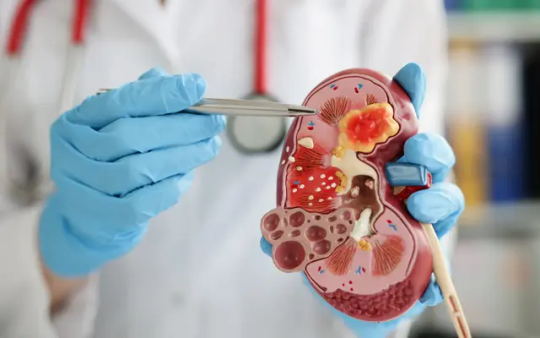
The symptoms of kidney stones can vary depending on their size and location within the urinary tract. Small stones may pass through the urinary system unnoticed, while larger stones can cause intense pain and discomfort, often described as sharp and stabbing, radiating from the side and back to the lower abdomen and groin. Other symptoms may include:
Painful urination
Blood in the urine (hematuria)
Frequent urination
Urinary urgency
Nausea and vomiting
Fever and chills (indicating infection)
Diagnosis of kidney stones usually involves a combination of medical history, physical examination, imaging tests (such as X-rays, CT scans, or ultrasounds), and urine analysis to determine the size, location, and composition of the stones.
Treatment options for kidney stones depend on factors such as the size and location of the stones, as well as the severity of symptoms. Small stones may pass spontaneously with increased fluid intake and pain management. However, larger stones or those causing severe symptoms may require medical intervention, including:
Pain management: Over-the-counter or prescription medications to alleviate pain and discomfort.
Fluid intake: Drinking plenty of water to help flush out the stones and prevent new ones from forming.
Medical therapy: Certain medications may help dissolve certain types of kidney stones or prevent their formation.
Extracorporeal shock wave lithotripsy (ESWL): A non-invasive procedure that uses shock waves to break up kidney stones into smaller pieces that can be passed more easily.
Ureteroscopy: A minimally invasive procedure where a thin scope is passed through the urethra and bladder to remove or break up stones lodged in the urinary tract.
Percutaneous nephrolithotomy (PCNL): A surgical procedure to remove large kidney stones through a small incision in the back.
In some cases, dietary and lifestyle modifications may be recommended to reduce the risk of recurrent kidney stones. These may include reducing salt and animal protein intake, increasing fluid intake, and avoiding certain foods high in oxalate or purines.
Overall, kidney stones are a common condition that can cause significant discomfort and complications, but with proper management and treatment, most people can successfully pass or remove kidney stones and prevent their recurrence with appropriate lifestyle changes.
0 notes